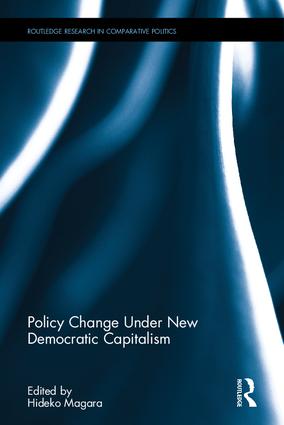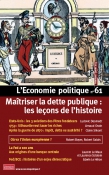Robert BOYER en la UNM – Congreso de Economía Política Internacional 2015 Universidad Nacional de Moreno
In Policy Change Under New Democratic Capitalism Edited by Hideko Magara, Chapitre 10,Routledge, , 2017, p. 202-222.
About the Book
Democratic capitalism in developed countries has been facing an unprecedented crisis since 2008. Its political manageability is declining sharply. Both democracy and capitalism now involve crucial risks that are significantly more serious than those observed in earlier periods. The notion of policy regimes has gained new significance in analysing the possibilities for a post-neoliberal alternative. Policy innovations directed towards an economic breakthrough require both political leadership and a new economic theory. The processes of political decision making have become quite distant from the public realm, and a limited number of economic and political elites exert influence on public policy.
This book examines, from a policy regime perspective, how developed countries attempt to achieve such a breakthrough at critical junctures triggered by economic crises. It initially assesses the nature of the present crisis and identifies the actors involved. Thereafter, it provides an analytical definition of a crisis, stressing that most crises contain within them the potential to be turned into an opportunity. Finally, it presents a new analytical design in which we can incorporate today’s more globalized and fluid context.
Table of Contents
I.Introduction
1.New Models of Democratic Capitalism and Policy Regime Change (Hideko Magara)
II.Models of New Democratic Capitalism
2.Crisis, Oportunity and Democracy in Contemporary Europe (Philippe Schmitter)
3.The Rise of the European Consolidation State (Wolfgang Streeck)
4.Cost of Democracy: Changing Aspects of Modern Democracy (Hiroshi Shiratori)
5.Institutional Change and Regime Crisis: A Critical Viewpoint on Neoliberalism (Toshio Yamada)
III.Comparative analyses
6.The Political-Economic Implications of De-industrialization with Varieties of Capitalism: An EU-Japan Comparative Analysis (Hiroyasu Uemura and Shinji Tahara)
7.Growth, Employment and Social Security Governance in the EU and Japan (Koji Fukuda)
8.The Diversity of the ‘Neoliberal Policy Regime’ and Income Distribution (Yuji Harada)
IV.Regime Competition in International Rivalry and Cooperation
9.Using Neofunctionalism to Understand the Disintegration of Europe (Philippe Schmitter and Zoe Lefkofridi)
10.From the Variety of Socioeconomic Regimes to Contemporary International Relations (Robert Boyer)
11.Balance-of-Payments Constraints, Change in Income Distribution, and Economic Growth in the Era of Globalization (Hiroshi Nishi)
About the Series
Routledge Research in Comparative Politics
Subject Categories
BISAC Subject Codes/Headings:
- POL024000
- POLITICAL SCIENCE / Public Policy / Economic Policy
- POL033000
- POLITICAL SCIENCE / Globalization
Seminario del 11, 12 y 14 de Noviembre 2014, Universidad nacional de Moreno (Argentine)
Primero Curso : La crisis actual a la luz de los grandes autores de la economia politica
Working Paper n° 67, 2014, Working Paper Series, desiguALdades.net, Freie Universität, Ibero-Amerikanisches Institut, Berlin.
 BoyerSASESEBringingAsia28062013 (7.1 MiB)
BoyerSASESEBringingAsia28062013 (7.1 MiB)
SASE Conférence « States in Crisis » Universita degli Studi di Milano, 27-29 June 2013
Network : Featured Panel, Friday 28 June 2013
 BOYERovercomingEU27062013short (5.8 MiB)
BOYERovercomingEU27062013short (5.8 MiB)
Présentation Power point au « 20th International Conference of Europeanists » : Crisis and Contingency: States of (In)stability, Amsterdam, The Netherlands • June 25-27, 2013

